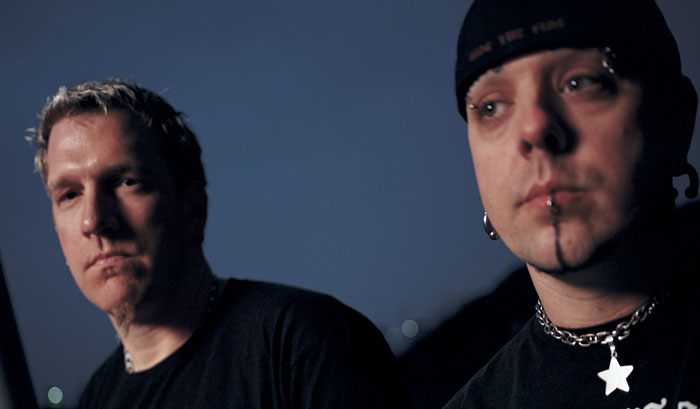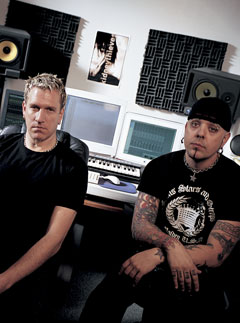


Once upon a time Bruce Somers was a drummer. "But now," he says, "my instrument is the studio." Somers is one-half of the industrial rock duo KidneyThieves. He and vocalist Free Dominguez have released three albums, including the recent Trickster Reprocess, and have placed songs in the films Queen of the Damned and Child's Play 4: The Bride of Chucky.
Somers has come to understand the musical potential of studio processing and arranging to create the Nine Inch Nails-inspired sound for which KidneyThieves are known. "I've been in a lot of bands, and I know how most bands record," he says. "with my old band Lula, we'd just go in and throw down the tracks. But with KidneyThieves, my approach is to get a good idea of the melody and the song structure, and then come up with different arrangements and textures. I don't like music that's always the same. With our music, we're trying to push it and make it a full cinematic experience, using all the colors that are available."
The 01V96 is so ridiculously powerful that it changes the way you do everything.
But production alone doesn't make a great record, says Somers. "You can have a lot of sounds and production, but if you don't have something solid underneath, it doesn't last. That's something that Free and I always agreed on: we want to create something that we'll still be proud of in a couple of years, not just a throwaway project."

The path to musical success hasn't always been smooth for Somers and Dominguez. "Our first label was Push," Bruce says. "Well, they didn't push our stuff very much-they started going under around the time our record came out in 1998. It was a nightmare. They fired our A&R guy the day our record was released. We had a band together, and we were ready to tour and everything, but they were like, 'hold off, we're having financial trouble.' And they were gone in six months. It took another year to hire a lawyer and get off the label! Then our second label pumped a lot of money into us right from the get-go, which was great-but believe it or not, right after our record was released, they fired our A&R guy, and it all went downhill from there. No one was really handling the release, and they ran out of money three months later."
Unfortunately, Somers says, this kind of story is all too common in the music business. But he and Dominguez were more fortunate than many of their peers. "At least we got to go out there and play for some people," he notes. "That's more than a lot of my buddies' bands got to do."
For KidneyThieves, the solution was to take control of their own resources. "Trickster Reprocess is on our own label. The record's been out for about six months, and we're already on our second pressing. And five of our songs are being used in one of this year's biggest video games, Deus Ex: Invisible War. Hopefully that'll let us reach people we haven't reached before."
Somers has also been busy crafting new material in the studio, using the latest addition to his "instrument": the Yamaha 01V96 Digital Mixing Console. "It's been amazing," he says. "We got it because we needed a mixer, but we didn't realize how incredible the features were until we started really getting into it. It's so ridiculously powerful that it changes the way you do everything. I've probably turned half a dozen other people onto this board. Everyone's really into it, because it's so inexpensive, and you can do so much with it. The I/O is insanely good. We basically control Pro Tools from this board. Then we send all the Pro Tools outputs back to the board so we can use the 01V96's onboard effects. it's incredible to be able to send all the drum tracks out, for example, and compress them, add reverb, EQ, and gates on every channel. The 01V96 is so economical. It's been really fantastic."
What's next for KidneyThieves? "Right now we really want to get out and do some more touring to support the record," says Bruce. "I work with this guy Stuart White, who's done back-line for Seal and Prince. He's our resident genius. The two of us work for about two months in the studio, just putting together the live show. We look for areas where we might want to make some creative adjustments in the arrangements, maybe put some parts on the sequencer versus playing them live, and go from there." he laughs. "Despite all the difficulties, we've really made some progress doing all this. So it's not as tragic as some bands I know!"
























